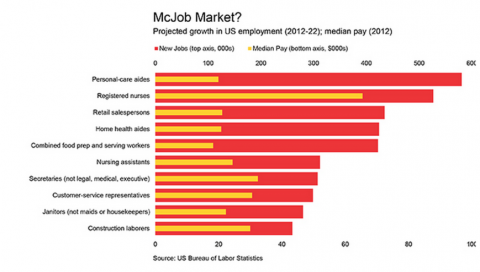That’s the conclusion of Stuart W. Elliott in his recent paper, “Anticipating a Luddite Revival.” (Hat tip: RobotEconomics.)
We’ve seen that scale of transformation before. But this one promises to be roughly four times as fast, dwarfing Luddite-era concerns:
…the portion of the workforce employed in agriculture shifted from roughly 80% to just a few percent. However, in the shift out of agriculture, the transformation took place over a century and a half, not several decades.
But there’s a much bigger difference this time — a hard limit that time can’t ameliorate:
The level 6 anchoring tasks in Table 2 are not only difficult for IT and robotics systems to carry out, but they are also difficult for many people to carry out. We do not know how successful the nation can be in trying to prepare everyone in the labor force for jobs that require these higher skill levels. It is hard to imagine, for example, that most of the labor force will move into jobs in health care, education, science, engineering, and law.
I’ve said it before: the median IQ is 100, by definition. Fifty percent of people are below that level. We (and they) are facing a hard cognitive limit that the Luddites never approached. I don’t think anybody reading (or writing) this post can appreciate how hard it would be to make a go of it in today’s technological society — even get through high school, much less provide a healthy, happy, financially secure life for one’s family — with an IQ of 80 or 90.
Are people who aren’t born smart lacking in “merit”? That’s what meritocrats are claiming. (Though they will vociferously defend themselves, deploying endless arguments both specious and obfuscatory.) If you’re in the low-IQ group (and don’t inherit), your miserable position in life is fixed at birth. Get over it.
Currently, work is the only way for the majority of people to legitimately claim any significant share of our remarkable prosperity. (Social-support programs provide a pretty insignificant and tenuous, insecure claim that’s not generally viewed as legitimate, only unfortunately necessary.)
If those folks 1. can’t find jobs that they can do, and 2. receive negligible claims on our prosperity if they are lucky enough to find one of the few remaining, we’re facing a world of haves and have-nots. Sound familiar?
Here’s the depressing chart of fastest-growing job categories and their wage levels that Elliott provides, based on BLS data:
One fundamental belief has to change: that finding and doing a job is the only thing that gives you any claim on a decent life. Because for many, jobs that provide decent claims simply aren’t there, or won’t be soon. (Likewise the belief that rebalancing your financial portfolio annually — doing the arduous, taxing work of “allocating resources” — is extremely meritorious and gives you a just claim on an outsized share of our collective prosperity.)
Horses faced exactly this situation in the first industrial revolution. They could never learn to drive tractors and trains.
I’ll be the first to say that people aren’t horses. Which gives rise to the ugly next thought:
They shoot horses, don’t they?
Cross-posted at Angry Bear.

Comments
4 responses to “Eighty percent of current jobs may be replaced by automation in the next several decades.”
Steve,
I saw this comment by you over at Interfluidity:
“@Steve Landsberg:
I can tell you do a spectacular job of indoctrinating your students into the price-theory/revealed-preferences shell game, wherein absolute/cardinal utility (because it cannot be measured) does not exist. A game in which even extreme concentrations of wealth and income not only don’t matter, but can’t matter.
It’s an utterly brilliant piece of logical, rhetorical, and political legerdemain, which has only become more effective with its endless obfuscatory embellishments over the decades.
The whole thing makes Soviet-era propaganda look foolishly, childishly crude and heavy-handed by comparison. I have to admit to being rather breathless with admiration at its sophistication and successful self-cloakery.”
Do you think you could write a post on this? It seems like a very important point, which I don’t see mentioned at all on the blogs.
@Phillippe: Good idea. I’ve been meaning to write that post at least since I wrote this one:
http://www.asymptosis.com/reading-mankiw-in-seattle.html
I’ll try to get to it.
Hi Steve,
Let’s not forget–automation can and will replace most “high skill” jobs (doctors, lawyers, and software engineers, for example). Automated diagnosis expert systems, for example, already outperform all but the very best doctors. It’s only a matter of time, and not a very long time. A high IQ and deep experience will not help very much.
On one hand, it’s fine. Most of the work that people do is a stupid and meaningless waste of human time (let alone potential). On the other hand…we’ve got some adjustments to make if we’re to stave off disaster. It’s like the economic version of global warming–it’s an undeniable catastrophe staring us in the face, and we’re doing exactly *nothing*.
Thanks,
Ole
@Ole: Right. But the cancer is creeping up from the bottom. It’s not just IQ, of course. That’s just one strong, somewhat artificial proxy for “ability to make stronger claims than machines (and their owners) can.”
If the only way to claim a share is to have the ability to out-compete the machines (so make stronger claims on prosperity than the machines’ owners), a steadily increasing portion of the population will not be able to claim a decent share absent government-designated, collectively agreed-upon claims.
But you knew all that.